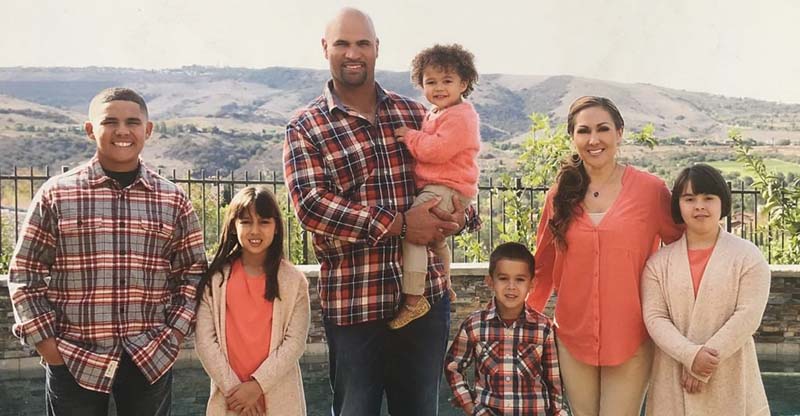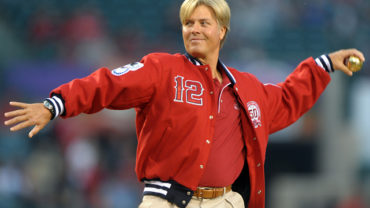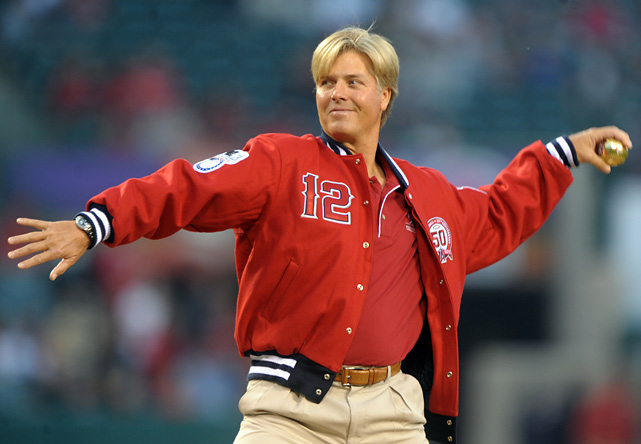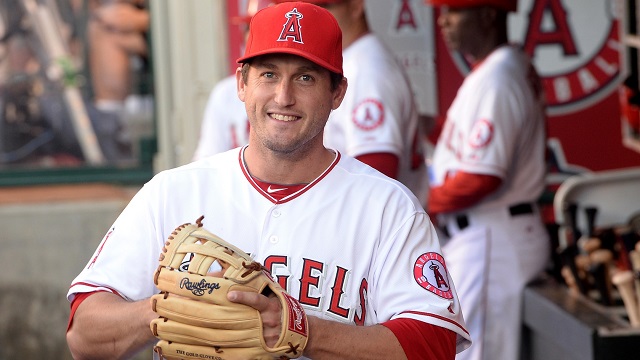Albert And Deidre: Remarkable Lives On The Field, And In The Community
It’s been a long, long journey…
In his 18th season, which has encompassed 17 years, one month and two days, it happened.
A Hit Is A Hit!
It wasn’t a laser. It wasn’t explosive. It didn’t register on the seismograph at Cal Tech in Pasadena.
But in the box score it didn’t matter whether is was a vicious line drive, or a broken bat blooper.
It’s only significance was that it will be forever remembered as No. 3,000.
So on May 4, Jose Alberto Pujols Alcantara flared a Mike Leake serve into shallow right field that ignited a celebration by an appreciative crowd in Seattle’s Safeco Field.
Part Of History
“It was fun that it turned into a little bit of a battle before he got a hit. Congratulations to him.
He’s a competitor at every second that he’s on the field. He’s been a joy to watch and a joy to compete against, for sure.” Leake said afterward.
“Three-thousand hits is a lot. I think the players that have played this game understand how hard it is to stay healthy and be that productive over that length of time,” Leake’s manager, Scott Servais, said. “It’s pretty special to get there.”
“The guys know the living history we are seeing every day with Albert,” marveled his manager, Mike Scioscia.
“These aren’t things you are going to say 15 years down the road ‘That was impressive.’ These are things that 15 seconds later you say ‘That was really special.’ It’s fun to watch.’
These guys in the clubhouse are enjoying being a part of it. They’re obviously very, very happy for Albert.”
Pujols became the 32nd member of a fraternity that is headed up by Pete Rose (4,256).
Accolades Galore
“Three thousand hits, man, is an accomplishment of longevity and consistency,” said Angel second baseman Ian Kinsler, a 35-year-old veteran of 13 seasons.
“It’s one of those lines in baseball the allows you to reflect on one player’s career, on what he has done, from a rookie all the way till now.”
“I’m aware of the legacy and the people that I tie and am on the same page right now,” Pujols said.
“But at the end of the day it’s about winning a championship. Nothing would be more special than in September and October and playing in the playoffs and bringing a championship back to the city of Anaheim.”
Pujols joins Hall Of Famer Rod Carew as the only other player to reach that plateau in an Angel uniform. Carew did it against his former Minnesota Twin teammates on August 4, 1985.
“The biggest compliment I can give Albert is he’s never changed,” Pujols’s former manager Tony La Russa once said. “He’s a perfect player. In all categories of the game—hitting, running, defense, cheer leading, being a mentor—you see Hall-of-Fame greatness.”
Averted A Disaster
Back in that spring of 2001 Cardinal incumbent first baseman Mark McGwire’s eagle eye liked what he saw in the Dominican rookie.
La Russa remembers McGwire telling him that if Pujols wasn’t on the opening day roster, “it might be one of the worst moves you make in your career.”
Albert didn’t waste any time.
On opening day, April 2, he touched Colorado’s Mike Hampton for his first major league hit.
It’s a story that began with Albert’s birth in Santo Domingo on January 16, 1980.
He was raised in poverty primarily by his grand mother, America Pujols, along with 10 uncles and aunts.
Tough Times
Father Bienvenido, himself a softball pitcher and heavy drinker, often gave Albert the keys to the car after post game celebrations at local pubs.
The trio (Albert, Bienvenido and America) had immigrated to New York City in 1996. Pujols’ parents had long since divorced.
Two months later, after witnessing a grocery store shooting, they scurried off to join relatives in Independence, Missouri.
As a youth, Pujols started practicing baseball with the help of limes (balls) and a milk carton (glove).
Where’s Your Birth Certificate?
During his senior season at Osage High School in Independence, opposing coaches defiantly walked Pujols 55 times, claiming he was older than 18. He still managed eight home runs in 33 at bats.
Following his graduation in December of 1998, Albert accepted a scholarship to Maple Woods Community College. He promptly distinguished himself by hitting a grand slam and pulling off an unassisted triple play in his first collegiate game.
Needless to say, after hitting .461 and crushing 22 home runs as a freshman shortstop, Pujols left school and opted for the Major League Draft.
Tampa Bay had the first pick that year. Devil Rays scout Fernando Arango recommended signing Pujols. When they selected Josh Hamilton instead, Arango angrily resigned.
Frankly, can you blame him? After all, we all know how that scenario played out!
No. 402!
The beneficiary were the Cardinals, who plucked Pujols in the 13th round. Four hundred and one players, many no names and others never heard from, went before the 6’3 240-pound athlete.
Ironically Albert spurned St. Louis’ initial $10,000 bonus offer and instead played for the Hays Larks of the Jayhawk Collegiate League, a summer league in the National Baseball Congress. After driving in 48 runs, the Cards upped the ante to $60.000 and sealed the deal.
It wasn’t the only deal Pujols sealed that winter. Six weeks before the start of spring training Albert and Deidre Corona tied the knot.
Pujols married a 21-year old single mom with a Down syndrome child, Isabella.
“I knew it even before the doctors knew,” Deidre remembers. “Minutes after I gave birth to my daughter the nurse showed her to me and I knew.”
The couple met at a Salsa Club for a girls night out function.
“Albert never went to clubs. He didn’t drink. He didn’t even want people smoking around him. In hindsight, it was amazing that he was there that night.
It was meant to be,” Deidre recalls.
And it was time to start their relationship with nothing in the closet.
No Secrets!
“He told me he had lied about his age. He had told me he was 21, but he was really only 18. But, I told him I had a confession of my own.
I found some literature about Down syndrome in Spanish to give to Albert, since he didn’t speak much English at the time,” Deidre says. “I wanted him to understand my situation completely.”
Admittedly, she was not to sure how Albert would respond.
But instead of turning his back and walking away, Albert embraced both mother and daughter with open arms.
So for the family of three, it was off to Illinois where Pujols began his professional career with the Peoria Chiefs of the Class A Midwest League.
“Albert was making $252 every two weeks,” laughs Deidre. “We were truly living on love! We ate a lot of macaroni dinners in those days.”
He hit .324. That was second to the infamous Ryan Gripp, whose eight minor and independent league seasons never advanced past Double-A.
Meanwhile Pujols’ debut impressed the Red Birds.
Overall, he hit .314, slugged 19 home runs, drove in 96 runs and had a OPS of .920 in 133 games with Potomac of the Carolina League (Class-A) and Memphis (PCL Triple-A) as well as Peoria. That earned him an invite to spring training the following February.
So I suppose it shouldn’t surprise anybody that he was the unanimous selection as the National League’s 2001 Rookie Of The Year.
Here’s all you need to know: Batting average, .329. Home runs, 37. Runs batted in, 130. OPS, 1.013.
Faithful Servant
But while Albert was busy on the field, Deidre too was keeping herself occupied.
As vice president of the Pujols Family Foundation, which was launched on May 5, 2005, Deidre has devoted her life to families with Down syndrome children.
“We have never forgotten our past or those who are truly in need,” Deidre says. “I believe we are put on this earth for a purpose. I believe God has blessed us with our unique circumstances for a specific reason. ‘Faith, Family and Others’ is so much more than a mission statement to me. I feel it’s my calling.”
Eventually, Albert can expect a call from the “Hall Of Fame”.
Only two other players, Willie Mays and Hank Aaron, are members of the elite 6oo home runs, 3000 hits club. (I purposely omitted Alex Rodriquez because of his questionable background).
“My goal was to try to get an opportunity to become a professional athlete,” Pujols said.
“I thank God for giving me the ability and the talent to do that. I never thought that my career would end up like this.
If I would have had 1,000 pages blank and the Lord would have said just write what you think is going to happen in 38 years, I wouldn’t have even come close to the history and the things that I’ve done in this game.”
… and it’s not over yet!
image: Albert and Deidre Pujols and family. Photo via The Mission Project via shawneemissionpost.com
John Stellman
Latest posts by John Stellman (see all)
- Eight Teams With A Common Bond, And A Ninth Just Crashed The Party - February 16, 2022
- Is This Dodgers Team Better Than Last Season’s World Champions?? - February 15, 2021
- New GM Minasian: Is 3rd Time The Charm, Or Is It 3 Strikes You’re Out? - November 16, 2020








